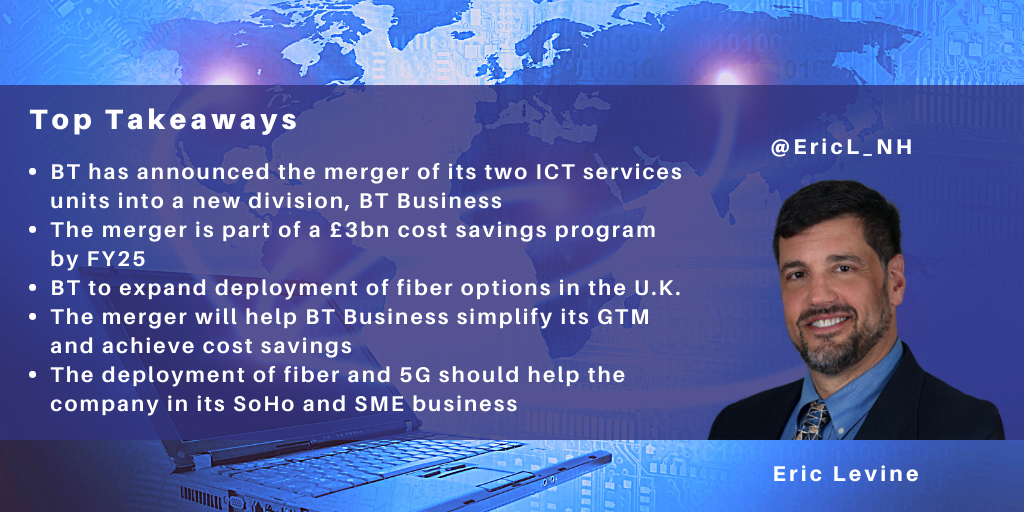posted on Jan 13, 2023 by Dominique Raviart

A New Focused Division
BT has announced the merger of its two ICT services units, Global and Enterprise, into a new division, BT Business. The new division will have pro-forma revenues of £8.5bn and an EBITDA of £2bn. The current CEO of Global will lead BT Business.
With this move, BT wants to unify its B2B market and focus its capabilities on connectivity, unified communication, networking, and security. It also wants to simplify its GTM for its corporate and public sector clients and remove duplication across Global and Enterprise.
Cost savings are an important element of the merger, with BT targeting cost savings of £100m by FY25 through consolidating management, support functions, product portfolios, and IT.
Financial Pressures
For the 3Q ending September 2022, the BT Group reported revenue of £10.4bn, up 1% due to growth in its Consumer and Openreach segments, and partially offset by legacy declines in large corporate customers in Enterprise and lower equipment sales in Global. Large corporate accounts and the decline of legacy products continue to present a challenge to the BT Group.
Global and Enterprise suffered from the pandemic, with revenues down by 14% and 8% respectively in FY21 (the year ending March 31). However, the two units did not benefit from the digital and cloud catch-up after the pandemic. Revenues were still down in FY22 (by 10% and 5% respectively) and in H1 FY23 (by 2% and 5% respectively).
The decline of Global and Enterprise reflects, unsurprisingly, portfolio changes. Global suffered from lower equipment sales and divestments (in Spain, Latin America, and France). Enterprise has suffered from the decline in legacy services, such as fixed telephony, despite mobile and VoIP growth in the SME and SoHo segments.
EBITDA struggled under pressure despite efficiency actions taken by BT, from its FY 22 in March, where EBITDA was down for Enterprise and Global, by 4% and 23% respectively, YOY. The decline continued into the results for the six months reported in September 2022, with Enterprise (23% down) and Global (5% down) for the six months YOY.
Fiber Deployment
The creation of BT Business is part of a larger cost savings program, with BT targeting £3bn in cost optimization by FY25. BT announced in November 2022 it wanted to save operational costs to fund its investment in deploying fiber options, OpenReach, throughout the U.K. The company targets 25m home and business customers by December 2026, up from 9m in December 2022. The investment comes at a time when BT, like many other European firms, faces rising energy costs. BT’s needs for investments do not stop with fiber deployment. The company is also investing in deploying 5G.
BT Business Outlook
Global and Enterprise had overlapping offerings and also suffered from internal competition on the large U.K. accounts. The merger should help BT Business simplify its GTM and achieve cost savings. It should help the new division to invest more in specific areas, e.g., digital, cloud, and security for large enterprises.
The merger will, however, probably not solve BT Business’ exposure to traditional voice and equipment resale, whose revenue decline has been long-lasting. BT Business will need to develop high-growth offerings through M&As to increase its service mix. Also, given the growing overlap between telecom and IT services, we think that BT Business will need to further lower its cost structure by increasing its India delivery network.
BT Business keeps an important SoHo and SME business, which intrinsically have different dynamics than ICT services to large enterprises. BT has a good track record in packaging services and offerings to its clients. The deployment of fiber and 5G should help the company gain market share in this customer segment. The question is whether this customer segment should be part of BT Business or BT Retail.
Certainly, between the two divisions, better clarity on customer focus and reduction of duplicative services and roles like solution and deal architects, financial analysts, and bid managers will provide the focus that the two units need and assist in meeting BT Group’s financial goals.
The new BT Business division will report as a single unit from April 1, 2023.
